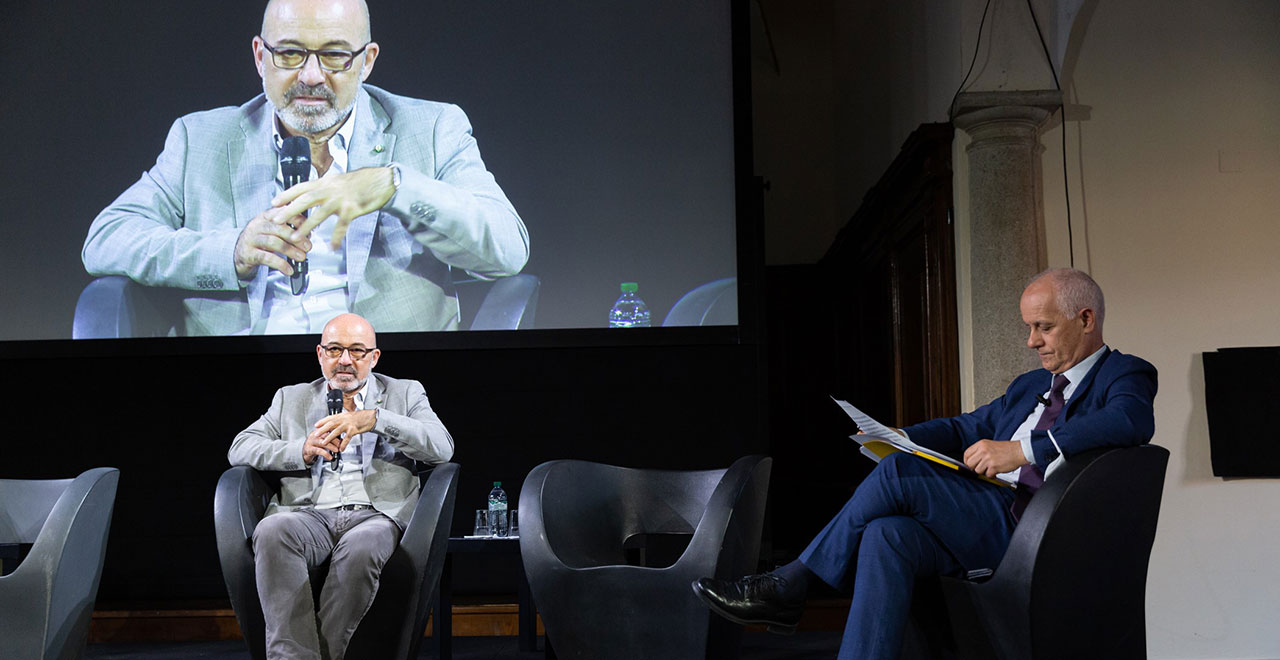Artificial Intelligence is one of the most extraordinary innovations of recent years and provides 'formidable aids' to our lives, especially in the fields of medicine, pharmacology and cognitive science. However, there is no shortage of risks linked to the human enhancement it is capable of triggering. How can we deal with the irruption of technologies, particularly AI, from a humanistic rather than a hyper-scientific and sectoral perspective? We need 'clear rules', starting with those on privacy. Roberto Cingolani, Minister for Ecological Transition, is convinced of this, speaking at the debate "Post-human, super-human or simply human?", which was held in Milan on Monday 13 September in the Sala Colonne of the Leonardo da Vinci National Science and Technology Museum.
The meeting, promoted in the year of its centenary by Università Cattolica del Sacro Cuore together with the Scientific Council of the Courtyard of the Gentiles, the body of the Pontifical Council for Culture, was preceded in the morning by a closed-door workshop at the Università Cattolica during which members of the Council and some forty professors from the University discussed the challenges posed by technology and Artificial Intelligence from a multidisciplinary perspective. This is a stage in a journey that the Courtyard of the Gentiles is pursuing with Università Cattolica, which is engaged in this field through numerous research projects and the dedicated Humane Technology Lab (HTLAB)
The first "thematic constellation" of the debate ‒ whose "complexity is reflected in the title", said the President of the National Science and Technology Museum Lorenzo Ornaghi in his opening greeting ‒ came from the video message of Cardinal Gianfranco Ravasi. The President of the Pontifical Council for Culture ideally evoked three fundamental words: anthropology, the polar star guiding human research, dazzlingly represented by Democritus in his definition "Ànthropos micròs còsmos" ("man is a small universe"); technology, one of the great fundamental ways in which we seek to define the perimeters and arteries of this còsmos, which is the human person; relationship, a decisive word for all cultures that have considered the human figure not as a sort of circle closed in on itself but as a cell of a larger organism.
Moreover, Franco Anelli, Rector of Università Cattolica, said, “we can expect an automaton to produce a work of manner, reproducing a given stylistic paradigm, but we do not expect originality. Humanity, then, should be sought in the ability to be creative, to give life to sensations that generate sensations”. And here lies the crux of the matter, which fully expresses "the dialectical tension between the two great poles of contemporaneity: technology and anthropology".
As Giuliano Amato, President of the Scientific Council of the Courtyard of the Gentiles, Vice-President of the Constitutional Court, asked: "Can the algorithm replace our brain? Can it replace our ego? Can it put us in the position of human beings who no longer make mistakes? Can we give up the creativity that is stimulated by specific circumstances?" Here, in short, “the hypothesis of the superhuman looms large, where, as Laura Palazzani has written in a fine book, ‘human enhancement risks becoming the instrument of a superpower that takes advantage of it’”.
The speakers at the debate were asked by Luciano Fontana, editor of Corriere della sera, the initiative's media partner, to understand what future scenarios await us. The first to respond was Paolo Benanti, Professor of Moral Theology at the Pontifical Gregorian University, who said that "the idea we have of the future is inseparable from the way we technologise reality", and that the knowledge machine can only be such if it is in a "symbiotic relationship" with the human being.
According to Palazzani, Deputy Vice-President of the National Committee for Bioethics, the race towards enhancement risks becoming the non-acceptance of human nature. Not only does it raise a number of problems related to the issue of 'human dignity'. Palazzani is convinced that man can improve himself without using 'enhancement techniques' but simply by improving the potential that is written into human nature, thus avoiding giving in to the 'blackmail of perfection'.
From the point of view of Silvano Petrosino, Professor of Theoretical Philosophy at the Università Cattolica, the problem is not to be for or against technology, but rather to grasp the fact that the more technology extends and becomes powerful, the more it tends to make man forget what was the task set by the creator, "to cultivate and preserve", which thus coincides with "to manipulate and dominate". Faced with all this, it is not enough to know, but it is necessary to want, warned Petrosino.
An important role, then, can be played by the rules. This was reiterated by Antonella Sciarrone Alibrandi, Vice-Rector of the University, who drew attention to the fact that the issue is addressed from two perspectives: the first is that of technology as an object of regulation; the second is that of the use of technology to produce rules that are applied in justice.
The Minister of Ecological Transition himself, Roberto Cingolani, summing up the meeting, emphasised the need for 'rules' and 'codes'. "The relationship between intelligent machine and human being still needs to be clarified and completely constructed, because the appearance of such intelligent machines is recent. Let us give ourselves time, culturally, socially, legally and ethically, to get used to coexisting with these technologies," Cingolani noted. But we should not fear for the primacy of man "because machines need to be switched on, they are cumbersome, they need a lot of energy and they need to be programmed". On the contrary, "I am more afraid of those who have the data and those who do the programming". Moreover, there are numerous fields in which digital transformation can have immediate and beneficial effects. First and foremost, the ecological one. "Certainly, the reduction of the water footprint and the smart grid, where some 4 billion will be invested, are practical and significant examples of how artificial intelligence can help improve human existence".




